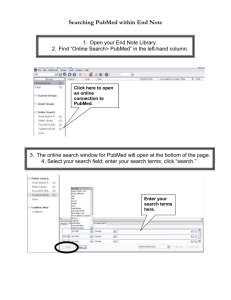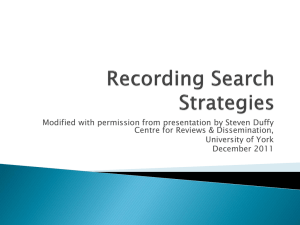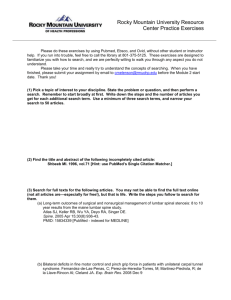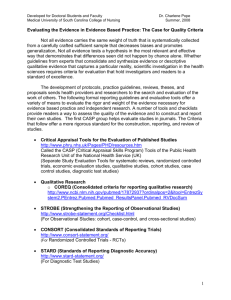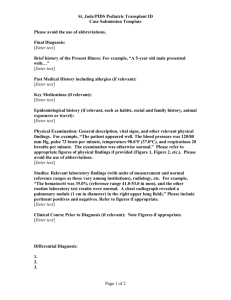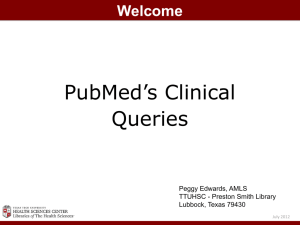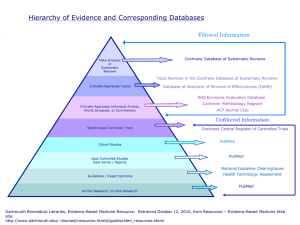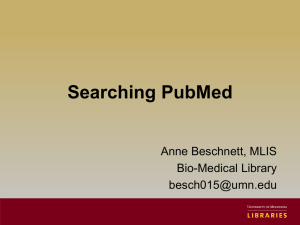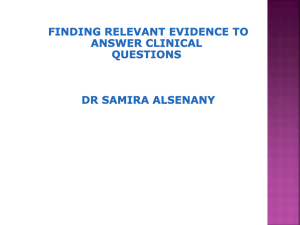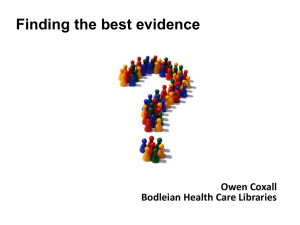An evaluation of the effectiveness of information literacy
advertisement
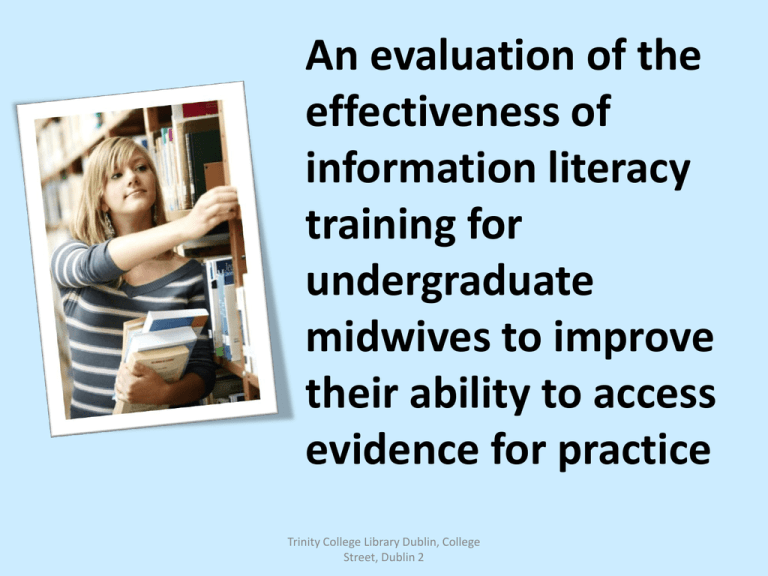
An evaluation of the effectiveness of information literacy training for undergraduate midwives to improve their ability to access evidence for practice Trinity College Library Dublin, College Street, Dublin 2 Or… How to try and stop your students just using Google A study involving… Greg Sheaf (Trinity College Dublin) Joan G. Lalor (Trinity College Dublin) Mike Clarke (Trinity College Dublin; Queen's University Belfast) and over 100 undergrad midwifery students from TCD. Thanks guys! Before we start… Oh, so you’re a librarian? I do love books… Source: Moovida …but I also love the Web! The World Wide Web is brilliant. It gives us access to so much information that used to be locked away or just didn’t exist. For instance: Before the WWW… Source: Anthropomorphised Cat Pictures, Late 19thEarly 20th Century: Louis Wain and Harry Whittier Frees After the WWW… Source: Aww! Kitten Pushes His Adopted Brother in a Cart Unfortunately there’s more to using the Web than just finding cat pictures, booking flights and Facebooking… It’s a shame, but you need more skills... Information Literacy? A set of abilities requiring individuals to “recognize when information is needed and have the ability to locate, evaluate and use effectively the needed information” “A survival skill in the Information Age” “It forms the basis for lifelong learning. It is common to all disciplines, to all learning environments and to all levels of education. It enables learners to master content and extend their investigations, become more self-directed, and assume greater control over their learning” Why we did it… Background Entrants to a new direct-entry midwifery degree were performing less ably than expected in conducting research… What they had got… • They would have only received a tour and a one-hour lecture, giving a general introduction to the Library (catalogue, website etc.). Clearly, this wasn’t enough. • Nursing students got that *and* a one-hour hands-on tutorial (repeated 11 times in their tutorial groups) on CINAHL in year one, repeated in year three. The perception… Source: http://imgur.com/gallery/7sLTM But is this true? The CIBER Report • “Information behaviour of the researcher of the future”, a report by CIBER (UCL Centre for Information Behaviour & the Evaluation of Research) • Released in January 2008 – we started at exactly the same time… • ‘Google Generation’ is a myth, says new research… Not only… • The “new report, commissioned by JISC [“the UK’s expert on information and digital technologies for education and research”] and the British Library, counters the common assumption that the ‘Google Generation’ – young people born or brought up in the Internet age – is the most adept at using the web. The report by the CIBER research team at University College London claims that, although young people demonstrate an ease and familiarity with computers, they rely on the most basic search tools and do not possess the critical and analytical skills to assess the information that they find on the web.” but also… • “The report ‘Information Behaviour of the Researcher of the Future’ also shows that research-behaviour traits that are commonly associated with younger users – impatience in search and navigation, and zero tolerance for any delay in satisfying their information needs – are now the norm for all age-groups, from younger pupils and undergraduates through to professors.” So… • Students think they are very good at finding information. • On the whole, they aren’t. • So we (who?) need to help show them! What we did… Source: DATABASE at Postmasters, March 2009 What they get *now*… A tour and a one-hour lecture, giving a general introduction to the Library (catalogue, website etc.) PLUS… Year One • Development of basic search skills for PubMed and an introduction to the TCD library catalogue and other sources (including Google) in general terms. Delivered by the subject librarian with a subject lecturer present. • Two 2-hour sessions in a computer laboratory. Year Two • Further instruction on PubMed, increasing the complexity of the search skills to include setting limits and selecting certain types of publication. Introduction to the My NCBI function in PubMed, to show how to receive notices of newly published material. Introduction to CINAHL, because of the large amount of relevant material outside of PubMed with an emphasis on transferable skills rather than learning by rote. Delivered by the subject librarian with a subject lecturer present. • Three 2-hour sessions in a computer laboratory. Year Three • Introduction to additional functions in PubMed (such as MeSH) and to The Cochrane Library, in particular The Cochrane Database of Systematic Reviews. Delivered by the subject librarian with a subject lecturer present; Cochrane session delivered by Mike Clarke. • Three 2-hour sessions in a computer laboratory. Databases and more… • PubMed. • CINAHL. • Cochrane Library. • Library Catalogue. • Google and Google Scholar. The nitty-gritty… • • • • • • Boolean operators – AND, OR and NOT. Using quotes and advanced Google searches. Limits and filters. Saving searches and My NCBI. MeSH terms and subject searching. Finding full-text resources. How did we evaluate it? Evaluation • Give students a question, before the first training session for the year and after the last one. Make them use Firefox as the browser. • Firefox stores its history in a file, so that can be found, attached and e-mailed. • A specialist program can then display those searches, including any words typed into any search boxes. The question You are looking for articles on: routine second trimester ultrasound in pregnancy • What do you thing students typed in? Where? Sample search history Evaluation continued • The search was then evaluated as “poor”, “fair” or “good”, and this was tracked from session to session. • For example, a student beginning her second year would have been shown PubMed in detail and overviews of other resources. Therefore they were evaluated: – PubMed and any other resource accessed: Good. – PubMed only accessed: Fair. – PubMed not accessed: Poor. Evaluation continued • After training involving PubMed and CINAHL, the post-instruction search in year two were categorised as follows: • PubMed and CINAHL accessed: Good. • PubMed, or PubMed and non-CINAHL resources accessed: Fair. • PubMed not accessed: Poor. Did it work? Success! Source: Know Your Memes Well, sort of… • Sessions in the first and second years of their undergraduate programmes produced the hoped-for improvements, with the majority of students whose searches were rated as poor or fair in the pre-instruction phase showing better information literacy after the sessions: 59 (97%) of the 61 students who were poor or fair pre-instruction in the first and second years combined improved. Among the 27 students whose searches were categorised as good in the pre-instruction phase in these two years, 17 (63%) remained good, 9 (33%) became fair and 1 (4%) became poor. • In general, the improvements were sustained by the start of the following year, with none of the students for whom data are available slipping back to poor. This supports the value of the sessions as a means for providing the students with the skills to find the research they will need for evidence-based practice. • However, by the third year, it would appear that the sessions no longer provide further improvement. The problems… • Hardware – often PCs would be out of service. • Software – a software upgrade halfway through caused problems. • PubMed keeps changing constantly. • Students – getting so many students to attend so many sessions was problematic. • I’m not a tutor! I have no formal teaching training - and sometimes the students and I would get exasperated with each other… The successes… • Some students actually seemed to enjoy the sessions! • Brought the School and the Library closer together. • An excellent way to build rapport between students and the Library (and me, as their librarian) – they seem to think of me as “theirs”. • Students far more likely to seek help and advice from me now. • …and they now use PubMed rather than Google. This is great, but… •It is scalable? This works well for 40 students at a time, but how about 240? Well, that’s me done… • An evaluation of the effectiveness of information literacy training for undergraduate midwives to improve their ability to access evidence for practice J.G. Lalor et al. Nurse Education in Practice, Volume 12, Issue 5, September 2012, Pages 269-272
